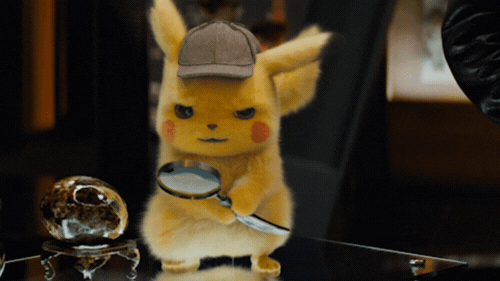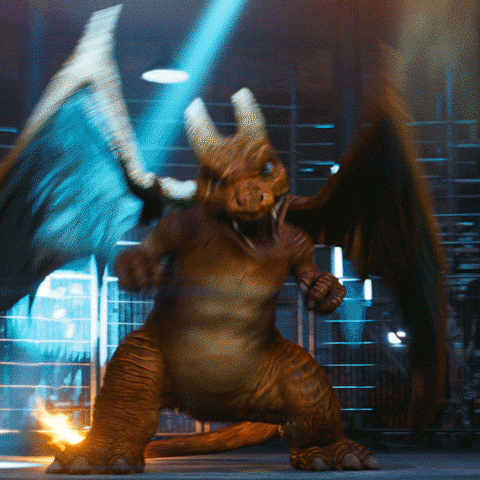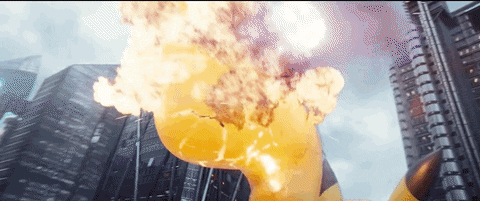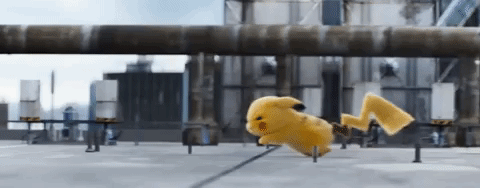
A children’s live-action comedy-mystery starring a talking mouse with a caffeine addiction, a searing wit that narrowly remains age-appropriate, and a heavy case of amnesia shouldn’t be such a successful combination, but it works well. Pokémon: Detective Pikachu is first and foremost a tech-demonstration movie whose splendid special effects take precedence above story complexity or character development, but despite some severe acting issues, some stellar casting choices and standout performances adeptly keep the film from feeling like a “graphics vehicle” and make it a strong recommendation for fans who are intimately familiar with the setting.

While understanding Detective Pikachu doesn’t require knowledge of its specific similarly-named game, most of its jokes and setting establishment both assume that the viewer has an encyclopedic knowledge, in some cases literally, of the series’ myriad eponymous creatures, their capabilities, and their relationships both with one another and with their human partners. It’s rare that a children’s movie asks such an academic investment of its viewer, but this gives the film a specific character that it tremendously benefits from: While the cliched story would be near-worthless without its diverse array of monsters, they do help elevate the production into something special and at times even poignant.
The film usually only stops to explain certain character quirks when they’re mandatory for story understanding (though this is frequent), such as a very creative scene involving the interrogation of a mime. Another standout example occurs early on in the film, where a sight gag involves an unusually sedate appearance of a Pokémon whose stress attacks trigger psychic outbursts. The irony of all that calmness made me think of the elevator scene from the first Sam Raimi Spider-Man film. There are welcome exceptions: the presence of fiery police dogs is portrayed in a common-sense manner that doesn’t insult the viewer’s intelligence or withhold crucial information from story novices.


The double-layered detective story, concerning a young man’s search for a missing father who was himself unraveling a dangerous conspiracy, is fairly simple once it’s fully established. For a movie that repeatedly shouts its rules and plot developments for the benefit of a young audience, however, it can be surprisingly challenging to initially follow as the viewer is continually tasked with keeping track of the intertwining plots and their respective clues.
Detective Pikachu reveals the bulk of its plot through its adorable eponymous star, adeptly portrayed by Ryan Reynolds in one of the most stellar casting decisions I’ve ever seen in a comedy. The good detective “acts” alongside his live-action partner, Tim (Justice Smith, no relation to Will), who in turn stumbles across Lucy (Kathryn Newton), a cute, plucky motormouth of a news-media intern who loudly shouts her personality attributes at him. He underacts! She overacts! They’re both perfect for each other despite her absurdly blunt character introduction and their utter lack of on-screen chemistry. The triple bright side of all this is that 1) both actors improve their performances significantly by movie’s end, 2) their arc gets resolved with more tact and reservation than it ever utilizes elsewhere, and 3) Lucy never feels reduced to a love interest or a plot device despite her own story being thin.
Tim’s backstory, though consisting of a number of tragic events, feels less emotionally contrived than reasonably believable and convincingly develops a central defining aspect of his personality. (He doesn’t spend most of the film feeling miserable despite his history, which works in his favor since Smith frankly seems to struggle with showing strong emotions during the few instances that require him to do so.) Reynolds’ voice-over performance as Pikachu incredibly shifts between comedic and morose at a moment’s notice, sometimes combining the two for some well-delivered dark humor. It’s worth noting that Pikachu’s facial expressions are animated excellently no matter his mood, and his moments of sadness, which are more frequent than a film like this would suggest, do a perfect job of evoking empathy.


The assorted varieties of “pocket monsters” on display are animated smoothly and believably, but Pikachu comes with a superb attention to detail that would have been easy to miss or take for granted; an early scene features him walking and bouncing across a mattress, which realistically deforms beneath his footsteps. Larger and more dangerous monsters such as the dragon-like Charizard are made to be screen-filling, which lends an important sense of menace and significance to fight scenes that are otherwise played for laughs.
Ryme City, a corporatocracy which shirks the “Trainer/battler” hierarchy that most of the games run on, is one of the most surprisingly gorgeous settings I’ve ever seen in a film, feeling chock-full of aesthetic detail that constantly references places and events from various Pokémon regions with a cavalcade of unique posters and neon storefront signs. Crucially, the setting always feels complex and hyper-detailed through the whole movie, in contrast to films like Captain Marvel and Looper where these kinds of crowded cityscapes all too often only get a few scenes’ worth of screen time and feel neglected or underutilized as a result.
One slightly odd aesthetic quirk is that many English signs are written in a typeface that resembles Japanese text but is used for English-language puns, which are thankfully infrequent even as the camera lingers on some of them. These aren’t as distracting as one of the stylistic choices was in Ratchet and Clank, another video-game adaptation whose story’s appeal feels largely confined to its existing audience, but they still feel like a lot of effort was made just for the sake of a series-classic name drop. Elsewhere, Lucy interns for a media outlet called ‘CNM,’ heavily implied to be “Clifford News Media” after the dynasty of its city’s founder, and though taking a swing at Jeff Bezos or Amazon would have been an easy target (particularly in a film that brings a very silly and random joke about climate change later on), the story admirably steers clear of modern politics despite its cosmopolitan and laudably diverse setting.


Though many of the action set-pieces here feel a bit genre-standard (animal chase, fight club, experiment lab), they all feel relevant and logical—even if at times that means a character has to do something reckless in order to move the plot along—instead of summoning a surprise monster to liven up the film’s pacing. The intensity of the violence, in contrast to the animated but more brutal first film’s undeserved general-audience label, never outstrips this film’s PG rating, though some physically and figuratively darker scenes later in the movie may unnerve very young viewers (and some of the jokes may unnerve parents of those viewers, though they thankfully don’t quite cross into PG-13 territory).
Tangentially related is a jaw-dropping set piece that somewhat resembles a mix of Inception and the epic-scale video game God of War (you can definitely make a strong guess where Toho Co., Ltd. worked on the film), and the movie, one of the few where I’ve felt the 3D actively improves the film’s use of foreground and background, has to be commended for keeping one of its very best tricks out of its marketing. Part of why Detective Pikachu feels like it really stretches and justifies its budget is that it evenly distributes its army of graphical effects throughout the film instead of piling most of them toward the front or the back. It’s a wonder a film like this, especially with so goofy a premise and little live-action precedent from its franchise, ever got made.


Though the film’s main human lead isn’t the most convincing performer (he really does try) and doesn’t have the most stirring dialogue to work with, its gumshoe rodent gets nearly all of the best lines and is hilarious or empathetic, even heartwarming, all the way to the end. Hearing Pikachu shout “Good God” during an action sequence is more entertaining than it has any right to be, but hearing him make a somehow-logical-in-context and still-PG joke about a woman’s birth canal, or about a shirtless thug’s nipples, will raise a bemused eyebrow, as well as potentially leading to some interesting conversations with the kids on the way home. Bill Nighy’s exaggerated, Shakespearean performance is dramatic/comedic gold, and the film does right by him in letting him chew as much scenery as he wants. Ken Watanabe, a jaded, past-his-prime lieutenant, is given little screen time or relevance but does get a cute Pokémon partner with more than enough personality in return.
It’s hard to overstate how vivaciously gorgeous this movie is, from the constant variety of “urban wildlife” to the setting design and especially the character animation; limb movements and particle effects excel a lot of this film’s even more expensive peers, and seeing sadistic grins from powerful Pokémon whose mouths rarely used to otherwise be animated is both impressive and frightening, without becoming too scary for viewers who weren’t born when this franchise’s first films and games were released. Creatures frequently convey their personalities through their movement, from competitive fighters who are proud of their immense strength to smaller beings who can most easily be likened to forest spirits. During one scene involving an injured character, the story makes a visual reference to the sort of heartwarming if illogical deus ex machina one would expect from a fairy tale, or indeed from this series’ original first movie, but then cruelly subverts this. While it’s a gloriously effective moment, the story tries to have its “yes/no” use of convenient solutions both ways, even as its sole real contrivance makes sense (or at least just as much sense) if you remember the original film.
Though the writing’s ingredients are anything but original, with scenes and concepts seeming to ape in some small fashion everything from Alien and Batman Begins to the aforementioned Looper, the story doesn’t feel like it leans too heavily on its extraordinarily long-running animated series. This is most evident in a naming contrivance that turns out to be a gigantic red herring, which might disappoint some viewers but keeps the film from being bogged down in needless subplots. Nevertheless, in avoiding blatant moral summations or other parent-placating clichés, the final product gleefully earns its own goofy but certainly enthusiastic definition of “memorable” when it could have gone for an easy audience by relying on its iconic franchise’s well-known formulas. And the film is certainly better for it.

Conclusion: He’d be damn proud of you, kid
In truth, I’d expected Pokémon: Detective Pikachu to front-load its premise and its giggles and then to bog down toward the middle before coming back up to speed with a big finish, but it never really stops doing something important, whether setting up the next joke or explaining a thin but surprisingly well-paced plot, usually doing both at once. While some scenes near the opening and middle definitely have a heavy “fan service” feel to them, with comic references to jargon and terminology that likely won’t make sense unless you’re an avid fan of the games, the film really feels like a story, a familiar and sometimes weird but nonetheless cathartic one, and not like a cynical or transparent merchandise advertisement or a constant reminder of the series’ beloved origins.
The film’s adorable mascot, its incredible attention to aesthetic details, and some golden casting choices are more than a match for its rare but noticeable instances of uneven acting and didactic dialogue, and if you’re willing to wade through a lot of early, embarrassing “children’s-movie” content, you’ll find a story that learns to give respect to its audience, all the while having fun with them in equal measure.

Image sources, property of Legendary Pictures; The Pokemon Company; Toho Co., Ltd; and Warner Bros.
– Movie poster – source
– Ryme City, daytime 01 – source
– Ryme City, daytime 02 – source
– Pikachu sleuthing – source
– Barista Ludicolo – source
– Pikachu dancing in arena – source
– Pikachu cowering – source
– Charizard – source
– Flareon – source
– Bulbasaur walking – source
– Parade balloon exploding – source
– Volt Tackle – source
This post was written and published for my movie review blog, Projected Realities.






